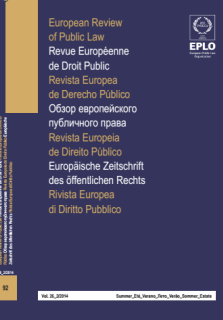
Constitutional Law / Droit constitutionnel
DENMARK / DANEMARK
MICHAEL HANSEN JENSEN
Professor at the University of Aarhus
This chronicle deals with the issue of the increased use of parliamentary investigations in order to support efficient control of the Danish Parliament over the government: Parliamentary investigations are primarily suited to investigate a minister's political responsibility; by formalising and professionalising the investigation body it is possible to investigate also not quite simple cases even though there is only the minister to stick to; and an advanced arrangement for allowing the questioning of government officials (and others) could be considered, including an arrangement based on voluntariness - but this must be weighed against specific counter-considerations, including the constitutional relationship between the Danish Parliament and the ministers, the government officials' service to the ministers and the consideration for the protection of the government officials' procedural rights. In this author's opinion, it is most preferable to use a model which formalises and professionalises the investigation body without allowing to ask other persons than the minister - maybe as a test and thereafter by assessing how the arrangement works in practice. This is not to say that an arrangement which includes questioning of government officials (and others) as seen in, for example, Great Britain and Norway should not be further considered.
Cette chronique passe en revue la question de l'utilisation accrue des enquêtes parlementaires afin de soutenir le contrôle efficace du Parlement danois sur le gouvernement: les enquêtes parlementaires sont faites essentiellement pour examiner la responsabilité politique d'un ministre; formaliser et professionnaliser l'organe d'investigation rend aussi possible l'examen de cas complexes, même si seul le ministre est concerné; et un arrangement avancé avec possibilité d'interroger des fonctionnaires (et autres) pourrait être envisagé, y compris un arrangement fondé sur le caractère volontaire - mais cela doit être mis en balance avec des considérations contraires spécifiques, par exemple la relation constitutionnelle entre le Parlement danois et les ministres, le service des fonctionnaires auprès des ministres et la prise en compte de la protection des droits procéduraux des fonctionnaires. L'auteur estime qu'il vaut mieux utiliser un modèle qui formalise et professionnalise l'organe d'investigation, sans possibilité d'interroger d'autres personnes que le ministre - peut-être sous forme d'essai et ensuite en constatant comment l'arrangement fonctionne dans la pratique. Cela ne veut pas dire qu'un arrangement incluant l'interrogatoire de fonctionnaires (et autres), comme c'est le cas par exemple en Grande-Bretagne et en Norvège, ne doit pas être envisagé.





















